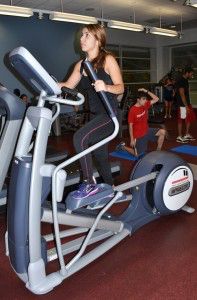
While students may forget to work out regularly, a recent study on cognitive health suggested that students who exercise may have better memory.
The University of Dublin study, cited in a Nov. 30 article in The New York Times, suggested that physical activity increases the level of the brain-derived neurotrophic factor protein that improves memory. The researchers tested male college students who exercised to varying degrees on their performance on memory tests.
Jamie Bunce, a Boston University researcher who is not affiliated with the original study, said the exact role this protein plays in cognition and recall is still being researched.
“This study raises some interesting questions about the way exercise affects cognitive performance,” Bunce said. “It’s still unclear what role BDNF is playing, as the study shows increases in BDNF levels didn’t necessarily correlate with more accurate memory performance.”
Karin Schon, senior postdoctoral associate at the BU Cognitive Neuroimaging Lab, said researchers at the BU Center for Memory and Brain are looking into the effects of cardio-respiratory fitness on memory-task performance.
The study suggested that a healthy lifestyle consisting of regular exercise promotes good brain health and may even protect individuals from neurodegenerative diseases such as Alzheimer’s Disease, according to the Times.
“The more we learn, the more it seems the old adage, ‘Healthy body, healthy mind’ is apt,” said Bunce.
Students said they have heard that exercise can prevent future diseases, such as Alzheimer’s, but never knew physical activity could improve your mental processes in the mean time.
“Now that I know it’s not just for the aging population, I might test out the theory for myself,” said Harsha Reddy, a sophomore in the College of Arts and Sciences.
Craig Baldino, a sophomore in the College of Communication, said this study has prompted him to consider his daily routine’s impact on his academic performance, especially as the Fall semester’s final grades approach.
“When I work out I definitely feel rejuvenated and more productive,” Baldino said. “I’m going to rethink my daily schedule if working out more would help me retain more information and bring up my GPA.”
College of General Studies sophomore Michalis Michaelides, however, said while exercise may improve your temporary cognition and memory, it probably does not mean that you will be a better or more productive student.
Despite what the study suggests about BDNF protein levels impact on memory, Bunce said she thinks students should not be quick to make assumptions about how much exercise can affect their academic performances.
“While the authors may argue that acute exercise is enough to increase performance on a memory task, I would hazard a guess that sprinting to your final, in and of itself, may not be sufficient to get that A,” Bunce said.
Citation: https://www.healtharty.com/
This is an account occasionally used by the Daily Free Press editors to post archived posts from previous iterations of the site or otherwise for special circumstance publications. See authorship info on the byline at the top of the page.



